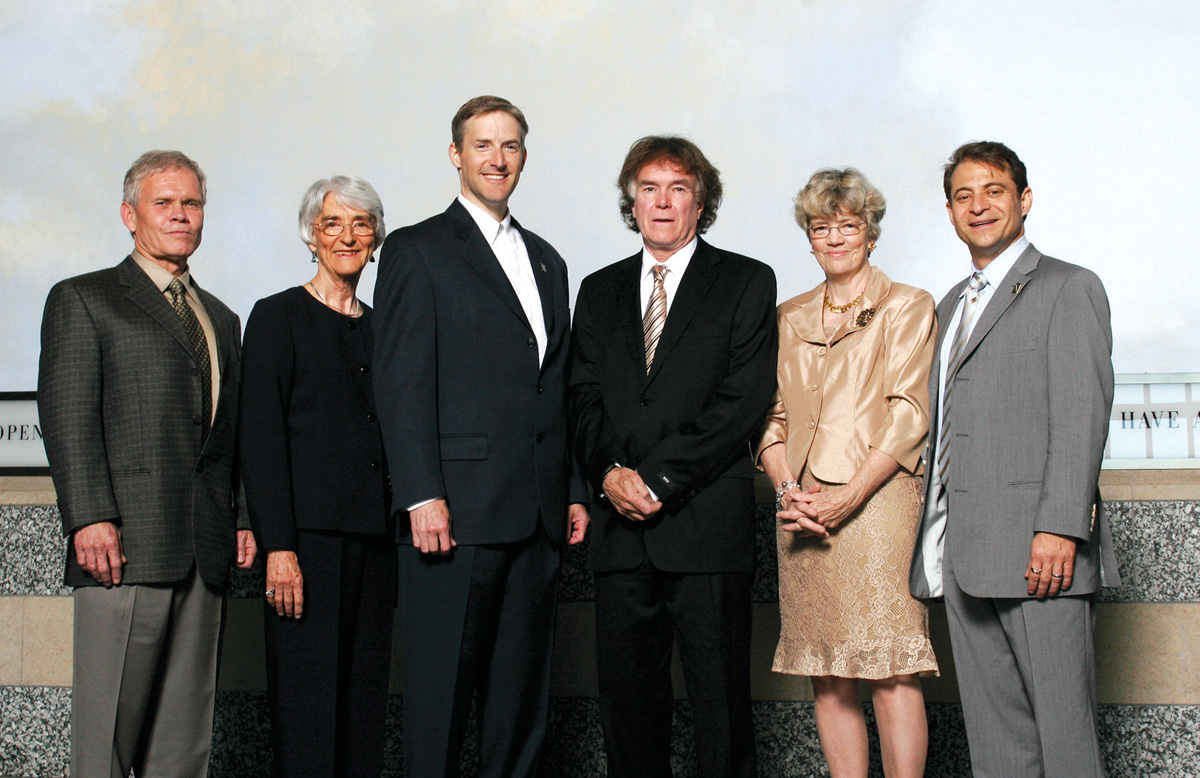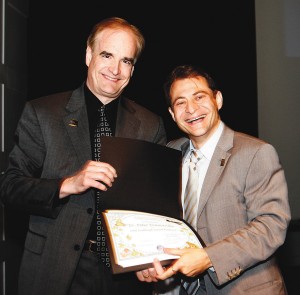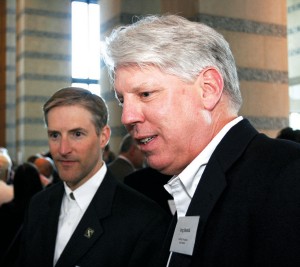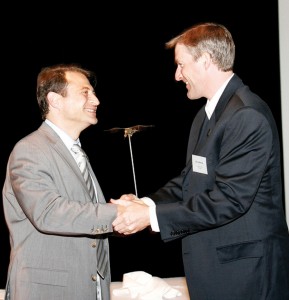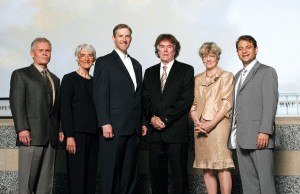
L to R: Rick Ridgeway, Patagonia, recipient of Award for Balance; Clare Hallward and Erik Lindbergh, Lindbergh Foundation (LF); recipient Will Steger, polar explorer; Reeve Lindbergh, LF; and recipient Peter Diamandis, X PRIZE Foundation.
Aviation enthusiasts and those with a passion for the environment seem to be an unlikely mix, but in the spirit of Charles and Anne Morrow Lindbergh, the Lindbergh Foundation brought them together on May 19. A crowd filled the Minnesota History Center’s 3M auditorium to near capacity that day for the 2006 Lindbergh Award Event.
The annual honorary Lindbergh Award builds on the foundation’s mission of improving the quality of all life by balancing our technological advancements with the preservation of the environment as it honors individuals who, through their work, have made significant contributions over many years toward the Lindberghs’ concept of balance. This year’s Lindbergh awardees, Dr. Peter Diamandis and Will Steger, exemplify this concept of balance.
“Together, they not only represent balance and the foundation’s mission, but they also reflect balance in human endeavors—on this planet and beyond!” said Lindbergh Foundation Honorary Chairman Reeve Lindbergh, the youngest daughter of Charles and Anne Morrow Lindbergh.
Dr. Peter Diamandis, a pioneer in the development of incentive prizes, was recognized with a 2006 Lindbergh Award for his ability to inspire the brightest minds on Earth to tackle some of the most pressing issues in the world today.
“A visionary, much like my grandfather, Peter Diamandis created the X PRIZE Foundation to change the current paradigm of space travel,” said Erik Lindbergh, grandson of Charles and Anne Morrow Lindbergh and vice chairman and director of the foundation.
During his introduction of Diamandis, Gregg Maryniak, vice president for aerospace science, the St. Louis Science Center, said, “Using the energy and material resources of free space to nurture our planet would be the ultimate balance of technology and the environment. . Dr. Peter Diamandis took up the challenge of human access to space. …”
“Given the origins of the X PRIZE Foundation, this award means so much to me personally and professionally,” said Diamandis, chairman of the X PRIZE Foundation, CEO of Zero Gravity Corporation and cofounder and CEO of Rocket Racing League. “The Lindbergh family has been a wonderful inspiration throughout the years and I look forward to continuing the heroic tradition of Charles Lindbergh with many new prizes.”
Will Steger, the first Minnesotan to receive a Lindbergh Award, made the first confirmed, unsupported trip to the North Pole with a team of eight people and 50 sled dogs in 1986. He was recognized with a 2006 Lindbergh Award not only for his numerous polar expeditions, but also for his deep understanding of the environment, his use of technology and his efforts to raise awareness of current environmental threats, especially climate change. Steger has been an eyewitness to the on-going catastrophic consequences of global warming. In 2007, utilizing the latest in Web and communications technologies, students, educators and individuals will be able to travel along with Steger as he embarks upon his next expedition entitled, “To the Ends of the Earth.”
CBS affiliate WCCO-TV’s chief meteorologist Paul Douglas introduced Will Steger.
“Will and I share a common concern: climate change and global warming,” he said. “It’s not alarmist hype; it’s real. I’ve become increasingly concerned about what I’m seeing in the data and what it might mean for our almost mythical quality of life, but Will Steger has lived it.”
On the subject of global warming, Steger said, “I’ve been such a fortunate person to have been in the era of exploration, before and after GPS. But more than that, I’m fortunate to be an educator and to be able to tap into the new technologies of the information age to reach people around the world.”
“I believe technology is our hope,” he continued. “We have technologies available already, but we need to capture the human spirit, especially the American spirit . to take on this initiative.”
Corporate Award for Balance
The Lindbergh Foundation presented Patagonia with the foundation’s first annual Corporate Award for Balance.
“Patagonia’s global view of the environment and their business practices are a superb model for other businesses to follow,” said Erik Lindbergh. “Their success demonstrates that operating a business with a strong environmental ethic can and does work, and in fact, may lead to a competitive advantage in the future.”
Rick Ridgeway, vice president for environmental and public affairs for Patagonia, Inc., accepted the award on behalf of Patagonia.
“Patagonia’s mission statement is to use business to implement solutions to the environmental crisis and inspire other businesses to do the same,” he said. “We’re genuinely pleased to see the Lindbergh Foundation embracing similar values. With both the prestige and recognition that comes with this award, we’ve all made a big step toward achieving the goal of inspiring businesses to act in a balanced, environmentally responsible way.”
“It’s very exciting to know that for the first time in its 29-year history, the Charles A. and Anne Morrow Lindbergh Foundation is awarding a Corporate Award for Balance, and that it’s being awarded to Patagonia, Inc.,” said Harrison Ford, 2003 Lindbergh awardee and friend of Patagonia’s founder, Yvon Chouinard. “This honor is very much deserved and I hope it will illuminate Patagonia’s leadership toward demonstrating alternatives to conventional, waste-intensive practices.”
Patagonia was recognized for its use of organically produced and recycled materials in its clothing line and its efforts to reduce its environmental footprint by incorporating energy-efficient lighting and heating systems and use of recycled building materials at its facilities.
Other aviation notables in attendance at the event included Dr. Paul MacCready Jr., John and Martha King and Greg Herrick.
Dr. Paul MacCready Jr., 1982 Lindbergh awardee and Lindbergh Foundation honorary board member, is the founder and chairman of AeroVironment, Inc. MacCready has been pioneering the use of alternate energy sources in aviation for more than 50 years, developing vehicles and devices that strike a balance between nature and technology.
He became known as the “father of human-powered flight” when his Gossamer Condor made the first sustained, controlled flight by a heavier-than-air craft powered solely by its pilot’s muscles. His Gossamer Albatross was the first aircraft to fly across the English Channel using only human power, in 1979. MacCready also won the Kremer Prize for both his Gossamer Condor and Gossamer Albatross.
John and Martha King have revolutionized the flight training industry and have taught nearly half of each year’s class of new private and instrument pilots in the United States. They’re the first couple to both hold every category and class of FAA pilot and instructor certificates. Martha King is the first and only woman to achieve this complete ratings sweep.
Greg Herrick is known as one of the nation’s foremost collectors of Golden Age aircraft and is a recognized leader in the aviation community. He’s president of the Aviation Foundation of America and publishes AircraftOwner magazine and the Historic Aviation catalog.
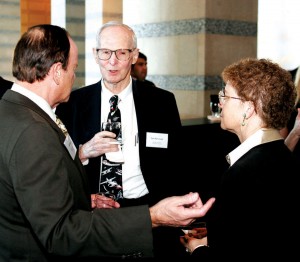
Paul MacCready (center), 1982 Lindbergh Award winner and chairman of AeroVironment, Inc., visits with John and Martha King of King Schools.
The Lindbergh Foundation is a public 501(c)(3) nonprofit organization, based in Anoka, Minn., which strives to improve the long-term quality of all life by balancing technological advancements and the preservation of our environment. The foundation also values individual initiative and accomplishments. Its programs are devoted to supporting, honoring and educating individuals through three major programs: the annual honorary Lindbergh Award, presented to individuals for significant contributions toward balance in their work; the Lindbergh Grants program, which provides grants in amounts up to $10,580 (the cost of building the Spirit of St. Louis in 1927) for research or education projects that will make important contributions to the technology/environment balance; and a variety of educational events and publications centered on the balance theme.
For more information on the Lindbergh Foundation, visit [http://www.lindberghfoundation.org].











